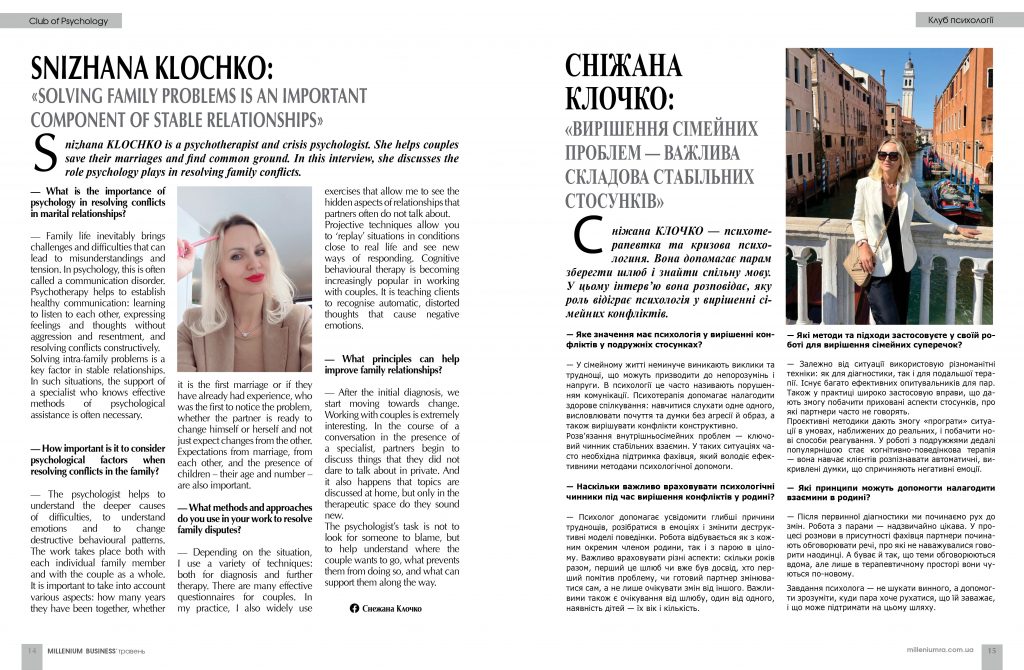Сніжана КЛОЧКО — психотерапевтка та кризова психологиня. Вона допомагає парам зберегти шлюб і знайти спільну мову. У цьому інтерв’ю вона розповідає, яку роль відіграє психологія у вирішенні сімейних конфліктів.

— Яке значення має психологія у вирішенні конфліктів у подружніх стосунках?
— У сімейному житті неминуче виникають виклики та труднощі, що можуть призводити до непорозумінь і напруги. В психології це часто називають порушенням комунікації. Психотерапія допомагає налагодити здорове спілкування: навчитися слухати одне одного, висловлювати почуття та думки без агресії й образ, а також вирішувати конфлікти конструктивно.
Розв’язання внутрішньосімейних проблем — ключовий чинник стабільних взаємин. У таких ситуаціях часто необхідна підтримка фахівця, який володіє ефективними методами психологічної допомоги.
— Наскільки важливо враховувати психологічні чинники під час вирішення конфліктів у родині?
— Психолог допомагає усвідомити глибші причини труднощів, розібратися в емоціях і змінити деструктивні моделі поведінки. Робота відбувається як з кожним окремим членом родини, так і з парою в цілому. Важливо враховувати різні аспекти: скільки років разом, перший це шлюб чи вже був досвід, хто перший помітив проблему, чи готовий партнер змінюватися сам, а не лише очікувати змін від іншого. Важливими також є очікування від шлюбу, одне від одного, наявність дітей — їх вік і кількість.
— Які методи та підходи застосовуєте у своїй роботі для вирішення сімейних суперечок?
— Залежно від ситуації використовую різноманітні техніки: як для діагностики, так і для подальшої терапії. Існує багато ефективних опитувальників для пар. Також у практиці широко застосовую вправи, що дають змогу побачити приховані аспекти стосунків, про які партнери часто не говорять.
Проєктивні методики дають змогу «програти» ситуації в умовах, наближених до реальних, і побачити нові способи реагування. У роботі з подружжями дедалі популярнішою стає когнітивно-поведінкова терапія — вона навчає клієнтів розпізнавати автоматичні, викривлені думки, що спричиняють негативні емоції.
— Які принципи можуть допомогти налагодити взаємини в родині?
— Після первинної діагностики ми починаємо рух до змін. Робота з парами — надзвичайно цікава. У процесі розмови в присутності фахівця партнери починають обговорювати речі, про які не наважувалися говорити наодинці. А буває й так, що теми обговорюються вдома, але лише в терапевтичному просторі вони чуються по-новому.
Завдання психолога — не шукати винного, а допомогти зрозуміти, куди пара хоче рухатися, що їй заважає, і що може підтримати на цьому шляху.
SNIZHANA KLOCHKO: «SOLVING FAMILY PROBLEMS IS AN IMPORTANT COMPONENT OF STABLE RELATIONSHIPS»
Snizhana KLOCHKO is a psychotherapist and crisis psychologist. She helps couples save their marriages and find common ground. In this interview, she discusses the role psychology plays in resolving family conflicts.
— What is the importance of psychology in resolving conflicts in marital relationships?
— Family life inevitably brings challenges and difficulties that can lead to misunderstandings and tension. In psychology, this is often called a communication disorder. Psychotherapy helps to establish healthy communication: learning to listen to each other, expressing feelings and thoughts without aggression and resentment, and resolving conflicts constructively.
Solving intra-family problems is a key factor in stable relationships. In such situations, the support of a specialist who knows effective methods of psychological assistance is often necessary.
— How important is it to consider psychological factors when resolving conflicts in the family?
— The psychologist helps to understand the deeper causes of difficulties, to understand emotions and to change destructive behavioural patterns. The work takes place both with each individual family member and with the couple as a whole. It is important to take into account various aspects: how many years they have been together, whether it is the first marriage or if they have already had experience, who was the first to notice the problem, whether the partner is ready to change himself or herself and not just expect changes from the other. Expectations from marriage, from each other, and the presence of children – their age and number – are also important.
— What methods and approaches do you use in your work to resolve family disputes?
— Depending on the situation, I use a variety of techniques: both for diagnosis and further therapy. There are many effective questionnaires for couples. In my practice, I also widely use exercises that allow me to see the hidden aspects of relationships that partners often do not talk about.
Projective techniques allow you to ‘replay’ situations in conditions close to real life and see new ways of responding. Cognitive behavioural therapy is becoming increasingly popular in working with couples. It is teaching clients to recognise automatic, distorted thoughts that cause negative emotions.
— What principles can help improve family relationships?
— After the initial diagnosis, we start moving towards change. Working with couples is extremely interesting. In the course of a conversation in the presence of a specialist, partners begin to discuss things that they did not dare to talk about in private. And it also happens that topics are discussed at home, but only in the therapeutic space do they sound new.
The psychologist’s task is not to look for someone to blame, but to help understand where the couple wants to go, what prevents them from doing so, and what can support them along the way.
